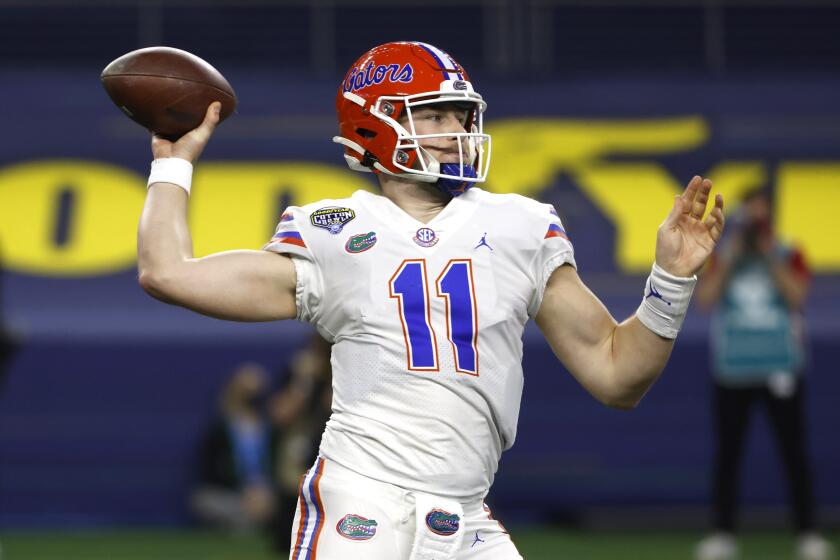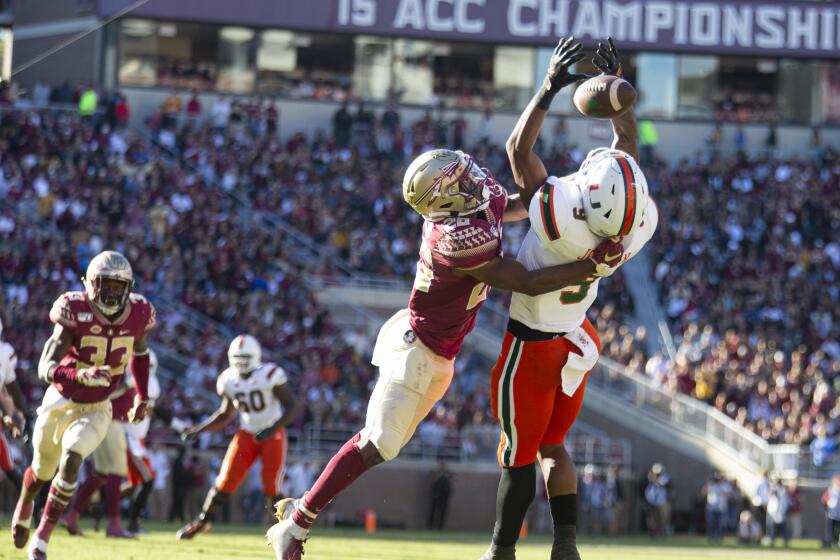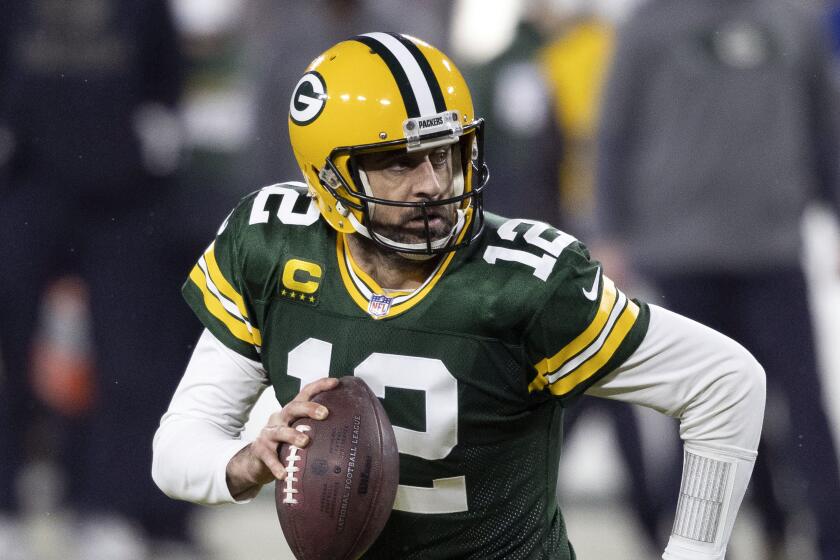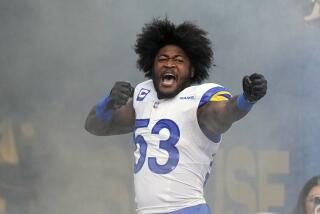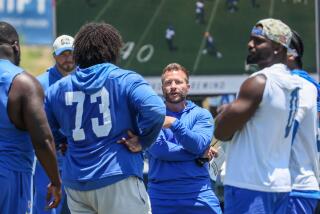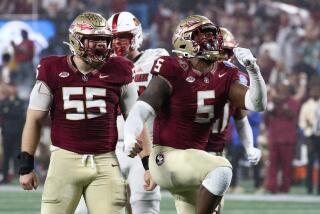Despite losing many defenders, Rams start NFL draft by picking a receiver
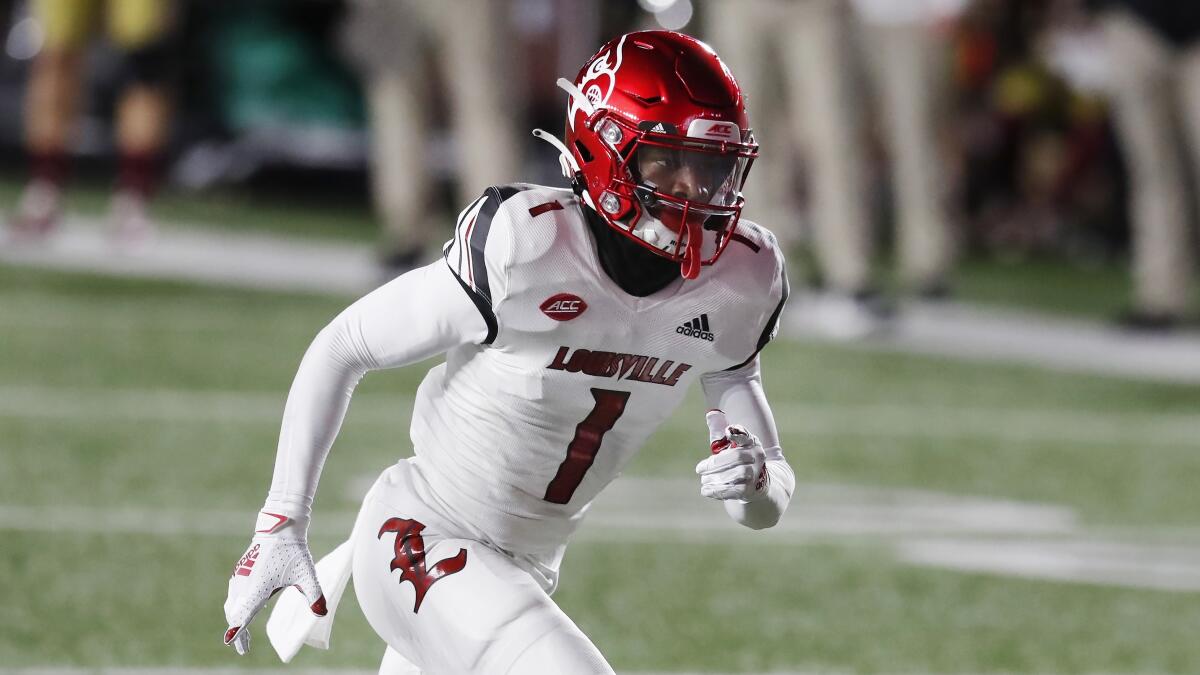
- Share via
The Rams lost five players and a coordinator from a defense that ranked among the NFL’s best in 2020.
But on Friday, they used their first pick in the NFL draft to add to coach Sean McVay’s offense.
The Rams selected speedy Louisville receiver Tutu Atwell in the second round with the 57th pick and then traded the 88th pick to the San Francisco 49ers for the 117th and 121st picks in Saturday’s fourth round. The Rams chose South Carolina inside linebacker Ernest Jones in the third round with the 103rd pick.
Barring more trades, the Rams’ have five remaining picks, including Nos. 117, 121 and 141 in the fourth round, 209 in the sixth and 252 in the seventh.
The Rams went into the draft having made two major offseason moves to improve an offense that slipped the last two seasons.
Quarterbacks were not as popular on the second day of the NFL draft in Cleveland, but then neither was Pittsburgh Steelers great Franco Harris.
They traded quarterback Jared Goff and two first-round picks to Detroit for quarterback Matthew Stafford. And they signed veteran receiver DeSean Jackson to give Stafford a deep threat.
Now Stafford has another potential one in Atwell, “a big-time gift,” McVay said, for an offense that includes receivers Jackson, Robert Woods, Cooper Kupp and Van Jefferson, a second-round pick in 2020.
“The more weapons you can surround yourself with offensively, especially around a player like Matthew Stafford, that’s very important to us,” McVay said.
McVay said that Jackson was “one of the all-time deep threats.” He said the 5-foot-9, 155-pound Atwell had some similarities, in his ability to stretch the defense.
“I see a player that plays a lot bigger than,” his physical size, McVay said.
Rams general manager Les Snead conducted the draft from his home because he tested positive for COVID-19 on Thursday. He said Atwell had “this rare, unique ability to explode off the ball and keep running fast the longer the down went.”
Atwell played quarterback in high school in Miami. But he moved to receiver at Louisville and scored 21 touchdowns in three seasons.
In 2019, he led the Atlantic Coast Conference with 1,276 yards receiving and 12 touchdowns, and he caught four passes that resulted in gains of 70 yards or more.
The Chargers started Day 2 of the NFL draft by picking a potential starter on defense, cornerback Asante Samuel Jr. out of Florida State.
Last season, Atwell caught 46 passes for 625 yards and seven touchdowns in nine games.
Atwell said during a videoconference with reporters that Rams receiver coach Eric Yarber told him, “Don’t be surprised if I don’t let you go past the second round.”
Atwell was happy the Rams followed through.
“Coach told me I would be a good fit for their offense and how they’re going to be able to use me, so I wasn’t surprised,” Atwell said. “Coach kept his word and I appreciate that.”
Though he has a small frame, Atwell said he overcomes that with skill and attitude.
“I just come with a chip on my shoulder at all times no matter what the situation is,” he said. “And I’m a go-getter.”
How McVay deploys Atwell remains to be seen. In 2017, McVay used Tavon Austin almost exclusively as a decoy. Austin was traded the following offseason.
Rams general manager Les Snead wouldn’t say if the team tried to trade for Packers quarterback Aaron Rodgers earlier this offseason.
Atwell sounded confident that he can contribute.
“I’m a great receiver,” he said, “and when the ball’s in my hands I know what to do with it. The thing is I just need the ball in my hands, and I’ll show you everything else.”
Peyton Manning was a role model when Atwell played quarterback, but he said he began to emulate NFL receivers when he switched positions.
“When I started getting into the receiver thing, I started watching the fast receivers and who I could be like,” he said.
He is looking forward to playing with Jackson, one of the league’s premiere deep threats.
“It will be awesome to pretty much play beside him and everything like that,” Atwell said.
The Rams traded with the 49ers feeling that they could still select Jones at 103, Snead said.
“If it’s not game day, it’s kosher to trade within the division,” Snead quipped.
Rams picks
TUTU ATWELL, wide receiver
5 feet 9, 155 pounds, Louisville, Round 2, Pick 57
Notable: Atwell played quarterback in high school in Florida. His father, Tutu Atwell Sr., played wide receiver at the University of Minnesota.
Last season: Atwell caught 46 passes for 625 yards and seven touchdowns in nine games. He averaged 13.6 yards per catch.
Why the Rams drafted him: The Rams are aiming to surround new quarterback Matthew Stafford with as many weapons as possible. The speedy Atwell joins a receiving corps that includes veterans Robert Woods, Cooper Kupp and DeSean Jackson and second-year pro Van Jefferson, a second-round pick last season. Atwell also could be valuable for new special teams coordinator Joe DeCamillis if he can improve as a kick returner.
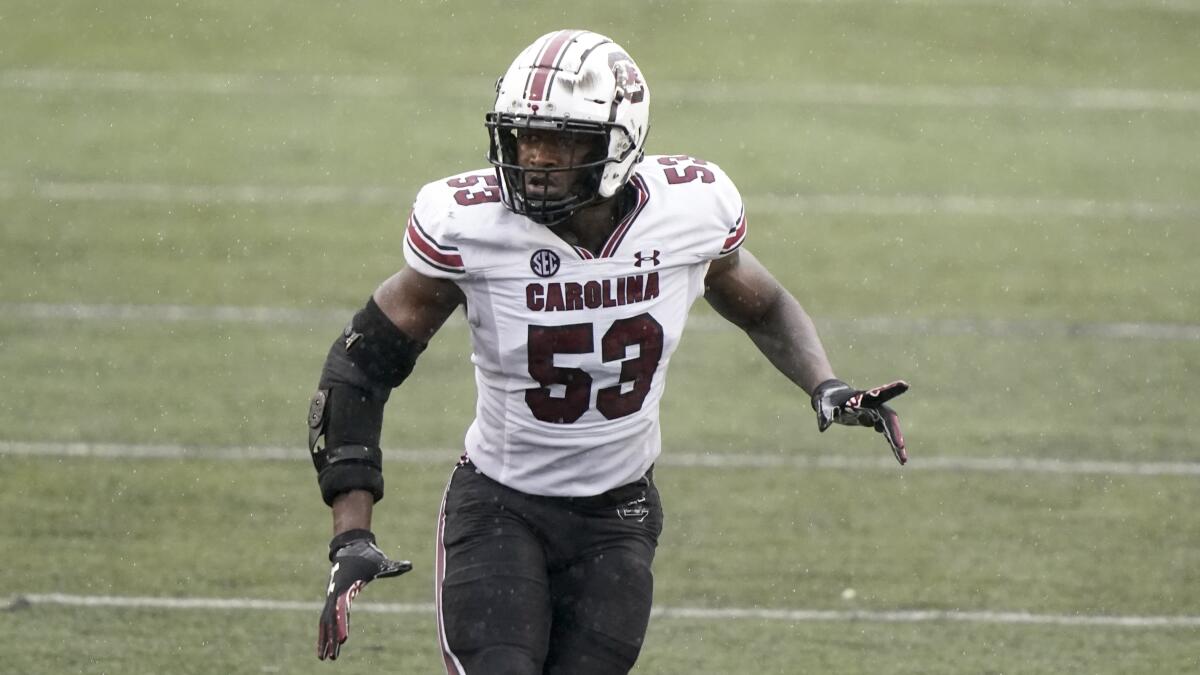
ERNEST JONES, linebacker
6 feet 2, 230 pounds, South Carolina, Round 3, Pick 103
Notable: Jones started two seasons at middle linebacker and was the leading tackler in both.
Last season: Jones made 86 tackles in nine games. He recorded more than 11 tackles four times and had a season-high 19 tackles against Louisiana State.
Why the Rams drafted him: The Rams return all of their inside linebackers from last season — Micah Kiser, Kenny Young, Troy Reeder and Travin Howard — but several are in the final year of their contracts. Jones can serve as backup and contribute on special teams.
More to Read
Go beyond the scoreboard
Get the latest on L.A.'s teams in the daily Sports Report newsletter.
You may occasionally receive promotional content from the Los Angeles Times.

